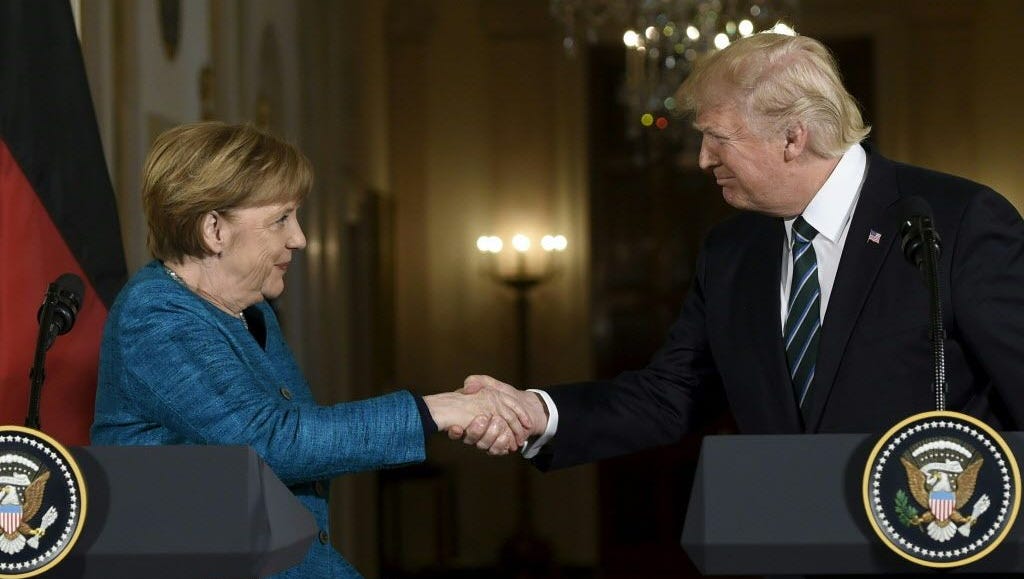Analyzing Trump's Harsh Rhetoric On European Trade Deals

Table of Contents
Targets of Trump's Criticism
Trump's harsh rhetoric on European trade wasn't indiscriminate; it targeted specific agreements and entities. Understanding these targets is crucial to analyzing the overall strategy and impact of his trade policies.
The Transatlantic Trade and Investment Partnership (TTIP)
Trump consistently denounced the Transatlantic Trade and Investment Partnership (TTIP) as a detrimental agreement for the United States. He frequently framed it as a deal that would lead to significant job losses in American manufacturing and unfair competition from European businesses.
- Specific criticisms: Trump argued TTIP would undermine American sovereignty, threaten national security interests, and fail to adequately protect American workers and industries.
- American manufacturing decline: He repeatedly linked TTIP to the perceived decline of American manufacturing, claiming it would exacerbate existing issues.
- European regulations: Trump expressed concerns about stringent European regulations, suggesting they would place undue burdens on American businesses.
Trump's statements on TTIP were frequently vehement. He famously declared it a "disaster" and vowed to withdraw from negotiations, highlighting the intensity of his opposition.
The World Trade Organization (WTO)
Trump's criticism extended to the World Trade Organization (WTO), which he accused of being biased against the United States and failing to adequately address trade imbalances. He viewed the WTO's dispute settlement system as ineffective and unfair.
- Examples of criticisms: Trump frequently cited trade deficits as evidence of WTO failure, arguing the organization didn't sufficiently protect American interests.
- Tariffs as responses: His administration imposed significant tariffs on various goods as a direct response to perceived unfair trade practices, circumventing WTO mechanisms.
- Implications for international trade governance: Trump's actions challenged the multilateral trading system, raising questions about the future of international trade governance and cooperation. His rhetoric sowed seeds of doubt about the effectiveness of established international institutions.
Specific European Countries and Industries
Trump's rhetoric didn't remain solely focused on broad agreements. He frequently targeted specific European countries and industries, using tariffs and trade disputes as instruments of his policy.
- Examples: Germany's automotive industry was a prime target, facing significant tariffs imposed by the Trump administration. Similar actions were taken against other European nations and sectors.
- Imposed tariffs and their impact: These tariffs led to retaliatory measures from the EU, escalating trade tensions and negatively impacting various industries on both sides of the Atlantic.
- Economic and political motivations: These targeted attacks often served both economic and political purposes, aiming to address perceived trade imbalances while also appealing to his domestic political base.
Motivations Behind Trump's Rhetoric
Trump's harsh rhetoric wasn't solely based on economic data; it was a complex blend of ideological, political, and economic factors.
"America First" Ideology
The cornerstone of Trump's trade policy was his "America First" ideology, a protectionist approach prioritizing American interests above international cooperation and multilateral agreements.
- Core tenets: This ideology emphasized prioritizing domestic job creation, reducing trade deficits, and protecting American industries from foreign competition.
- Impact on trade policy: This approach directly influenced his administration's trade negotiations, leading to a more unilateral and aggressive stance.
- Nationalism and trade negotiations: The rise of nationalism played a significant role in shaping Trump's trade rhetoric and policies, impacting the global trading landscape.
Domestic Political Considerations
Trump skillfully used trade rhetoric as a powerful tool to rally his base, framing trade deals as threats to American jobs and economic prosperity.
- Political advantages of protectionism: A protectionist stance resonated with segments of the electorate who felt disadvantaged by globalization and free trade agreements.
- Relationship to electoral strategy: Trump's use of trade rhetoric as a campaign tool highlights the political expediency of protectionist sentiment in certain contexts.
- Appealing to the base: His strong stance against trade deals helped consolidate support among his core voters.
Economic Concerns
While framed in nationalist terms, Trump's rhetoric also reflected genuine economic concerns, particularly about trade imbalances and the decline of American manufacturing jobs.
- Specific economic anxieties: The loss of manufacturing jobs to overseas markets was a central concern driving his protectionist rhetoric.
- Complexities of the economic arguments: While economic anxieties were valid, the complexity of global trade made it difficult to directly attribute specific job losses solely to trade deals.
- Trade deficits and their perceived negative impacts: Trump often focused on trade deficits as a key indicator of unfair trade practices, a simplified view of a complex economic issue.
Consequences and Lasting Impacts
Trump's trade rhetoric had far-reaching consequences, altering the dynamics of transatlantic relations and the global trading system.
Strained Transatlantic Relations
Trump's aggressive approach significantly damaged US-EU relations, creating uncertainty and increasing tensions.
- Examples of strained relations: Trade disputes, tariff wars, and diplomatic clashes characterized the relationship during his presidency.
- Long-term impact: The damage to the transatlantic partnership created lasting mistrust and challenges for future cooperation.
- Impact on diplomatic cooperation: This affected cooperation on issues beyond trade, creating ripples throughout the international community.
Shift in Global Trade Dynamics
Trump's actions provoked responses from other countries, accelerating a global shift toward protectionism and trade fragmentation.
- Retaliatory tariffs: Other nations imposed retaliatory tariffs, creating a global trade war that disrupted supply chains and increased prices for consumers.
- Changes in global trade patterns: The actions taken during this period altered global trade patterns, with some countries seeking to establish alternative trade relationships.
- Impact on multilateral trade agreements: The rise of protectionist sentiment challenged the efficacy and future of multilateral trade agreements.
Impact on Specific Industries
The tariffs and trade disputes directly affected various industries in both the US and Europe, resulting in both winners and losers.
- Industries significantly impacted: The automotive, agricultural, and steel industries, among others, experienced significant disruptions.
- Positive and negative consequences: While some industries benefited from protectionist measures, others faced decreased exports and increased costs.
- Long-term economic effects: The long-term economic effects of these disruptions are still being assessed and will likely continue to unfold for years to come.
Conclusion
Trump's harsh rhetoric on European trade deals profoundly impacted transatlantic relations and the global trading system. His "America First" approach, a mix of nationalist ideology, domestic political calculations, and economic concerns, resulted in heightened trade tensions, damaged alliances, and a more protectionist world. Understanding the complexities of Trump's European trade rhetoric and its lasting effects is crucial for navigating future trade negotiations and fostering stronger international cooperation. Continued analysis and research into the long-term economic effects of these policies are necessary to fully understand the legacy of Trump's impact on global trade. Further study into the nuances of Trump's European trade rhetoric is essential for future policymakers and international relations experts.

Featured Posts
-
 Lewis Hamiltons Impact The F1 Rule Change He Influenced
May 26, 2025
Lewis Hamiltons Impact The F1 Rule Change He Influenced
May 26, 2025 -
 Mathieu Van Der Poel Achieves Paris Roubaix Hat Trick Dominance In Hell Of The North
May 26, 2025
Mathieu Van Der Poel Achieves Paris Roubaix Hat Trick Dominance In Hell Of The North
May 26, 2025 -
 Deces D Albert Luthers Hommage A Un Frere Cher A Thierry Luthers
May 26, 2025
Deces D Albert Luthers Hommage A Un Frere Cher A Thierry Luthers
May 26, 2025 -
 Jadwal Lengkap Moto Gp Inggris 2025 Fp 1 Kualifikasi Dan Race Di Trans7
May 26, 2025
Jadwal Lengkap Moto Gp Inggris 2025 Fp 1 Kualifikasi Dan Race Di Trans7
May 26, 2025 -
 Masa Israels Record Breaking English Yom Ha Zikaron Ceremony
May 26, 2025
Masa Israels Record Breaking English Yom Ha Zikaron Ceremony
May 26, 2025
Latest Posts
-
 Ufc Fighter Jon Jones Discusses Training Injury Involving Hasbulla
May 30, 2025
Ufc Fighter Jon Jones Discusses Training Injury Involving Hasbulla
May 30, 2025 -
 Jon Jones Reveals Injury Sustained During Hasbulla Sparring Sessions
May 30, 2025
Jon Jones Reveals Injury Sustained During Hasbulla Sparring Sessions
May 30, 2025 -
 Djokovic Triumphant In French Open Debut
May 30, 2025
Djokovic Triumphant In French Open Debut
May 30, 2025 -
 Jon Joness Hasbulla Fight Injury Details Revealed
May 30, 2025
Jon Joness Hasbulla Fight Injury Details Revealed
May 30, 2025 -
 French Open Djokovic Wins Opening Match
May 30, 2025
French Open Djokovic Wins Opening Match
May 30, 2025
